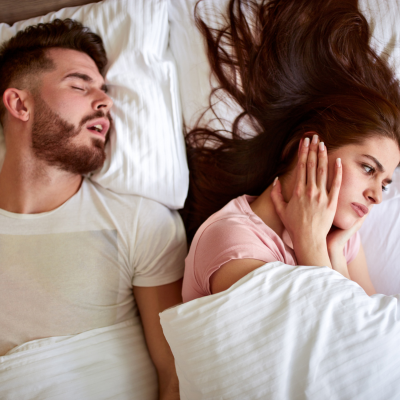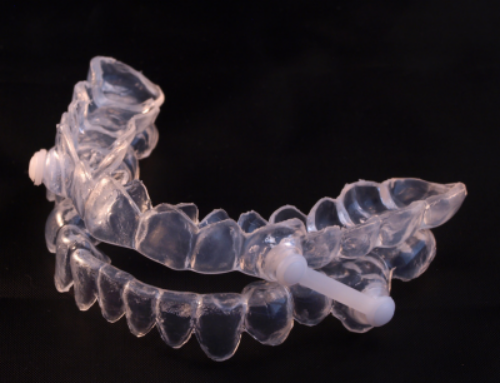 Sleep is a vital component of our overall health, yet many people suffer from sleep disorders that significantly impact their quality of life. Snoring, sleep apnea and temporomandibular joint (TMJ) disorders are three such conditions that, while distinct, can be interconnected. Understanding the relationship between these issues is crucial for effective treatment and improved well-being. At Virginia Sleep & TMJ Therapy, we specialize in addressing these conditions with a comprehensive, patient-centered approach for our patients in Richmond, East Highland Park, Lakeside and Mechanicsville, VA.
Sleep is a vital component of our overall health, yet many people suffer from sleep disorders that significantly impact their quality of life. Snoring, sleep apnea and temporomandibular joint (TMJ) disorders are three such conditions that, while distinct, can be interconnected. Understanding the relationship between these issues is crucial for effective treatment and improved well-being. At Virginia Sleep & TMJ Therapy, we specialize in addressing these conditions with a comprehensive, patient-centered approach for our patients in Richmond, East Highland Park, Lakeside and Mechanicsville, VA.
The Basics: Snoring, Sleep Apnea and TMJ Disorders
- Snoring: Snoring happens when the airflow through the mouth and nose is partially blocked during sleep. This blockage makes the throat tissues vibrate, creating the distinctive sound of snoring. Occasional snoring is common and usually harmless, but chronic snoring can be a sign of more serious health problems.
- Sleep Apnea: Sleep apnea involves periodic disruptions in breathing while asleep. These interruptions, called apneas, can last from a few seconds to minutes and may occur multiple times per hour. The most common type is obstructive sleep apnea (OSA), where the airway becomes blocked, often by the collapse of soft tissue in the back of the throat. This blockage prevents air from reaching the lungs, leading to fragmented sleep and reduced oxygen levels in the blood.
- TMJ Disorders: TMJ disorders encompass a variety of conditions affecting the temporomandibular joint, which connects the jawbone to the skull. Symptoms can include jaw pain, headaches, earaches and difficulty in opening or closing the mouth. These disorders can result from various factors, including injury, arthritis, or bruxism (teeth grinding).
Snoring, Sleep Apnea and TMJ: The Connection
While snoring, sleep apnea, and TMJ disorders may seem unrelated, they are often interlinked.
- Anatomical Factors: The anatomy of the jaw and airway plays a significant role in all three conditions. A retruded jaw (one that is positioned further back than normal) can contribute to airway obstruction, increasing the likelihood of snoring and sleep apnea. This same jaw position can also place extra stress on the TMJ, leading to TMJ disorders.
- Bruxism: Teeth grinding, or bruxism, is commonly associated with TMJ disorders and can be a response to airway obstruction during sleep. The body instinctively moves the jaw to open the airway, which can cause wear and tear on the TMJ.
- Sleep Position: The position in which you sleep can affect all three conditions. Sleeping on your back can cause the tongue and soft tissues to collapse into the airway, leading to snoring and sleep apnea. It can also put strain on the TMJ.
- Sleep Fragmentation: Disrupted sleep from snoring or sleep apnea can increase the risk of bruxism, exacerbating TMJ disorders. Conversely, pain from TMJ disorders can lead to sleep disturbances, creating a vicious cycle.
Comprehensive Treatment Approaches
At Virginia Sleep & TMJ Therapy, we believe in a holistic approach to treating these interconnected conditions. Here are some comprehensive treatment strategies we employ:
- Diagnosis: Accurate diagnosis is the first step. We utilize a combination of patient history, physical examination and diagnostic tools such as polysomnography (sleep study), cone beam CT scans and MRI to assess the presence and severity of snoring, sleep apnea and TMJ disorders.
- Customized Oral Appliances: Oral appliances can be highly effective in treating both sleep apnea and TMJ disorders. For sleep apnea, a mandibular advancement device (MAD) helps keep the airway open by repositioning the jaw forward. For TMJ disorders, a custom splint or mouthguard can alleviate pressure on the joint and prevent teeth grinding.
- Lifestyle Modifications: Lifestyle changes can significantly impact the severity of these conditions. Weight loss, changing sleep positions, avoiding alcohol and sedatives, and practicing good sleep hygiene are all beneficial.
- Physical Therapy and Exercises: For TMJ disorders, physical therapy and specific exercises can strengthen the jaw muscles, improve joint function and reduce pain. These exercises can also help mitigate the impact of sleep apnea by promoting better muscle tone in the airway.
- Continuous Positive Airway Pressure (CPAP) Therapy: For moderate to severe sleep apnea, CPAP therapy remains the gold standard. This treatment involves wearing a mask that delivers continuous air pressure to keep the airway open during sleep.
- Collaborative Care: A comprehensive approach involving multiple disciplines is often necessary for effective treatment. We work closely with ENT specialists, sleep physicians and other healthcare providers to ensure comprehensive care tailored to each patient’s unique needs.
Snoring, Sleep Apnea and TMJ: Request Your Appointment in Richmond, VA Today
Snoring, sleep apnea and TMJ disorders are complex and interrelated conditions that can significantly impact your quality of life. Understanding the connections between them is essential for effective treatment. At Virginia Sleep & TMJ Therapy in Richmond, VA, our comprehensive, patient-centered approach ensures that you receive the best possible care, addressing all aspects of these interconnected conditions. If you are experiencing symptoms of snoring, sleep apnea, or TMJ disorders, contact us today to request an appointment and take the first step towards better sleep and overall health.




